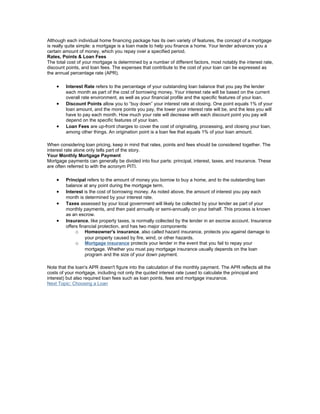
Rate Point Fees
- 1. Although each individual home financing package has its own variety of features, the concept of a mortgage is really quite simple: a mortgage is a loan made to help you finance a home. Your lender advances you a certain amount of money, which you repay over a specified period. Rates, Points & Loan Fees The total cost of your mortgage is determined by a number of different factors, most notably the interest rate, discount points, and loan fees. The expenses that contribute to the cost of your loan can be expressed as the annual percentage rate (APR). • Interest Rate refers to the percentage of your outstanding loan balance that you pay the lender each month as part of the cost of borrowing money. Your interest rate will be based on the current overall rate environment, as well as your financial profile and the specific features of your loan. • Discount Points allow you to “buy down” your interest rate at closing. One point equals 1% of your loan amount, and the more points you pay, the lower your interest rate will be, and the less you will have to pay each month. How much your rate will decrease with each discount point you pay will depend on the specific features of your loan. • Loan Fees are up-front charges to cover the cost of originating, processing, and closing your loan, among other things. An origination point is a loan fee that equals 1% of your loan amount. When considering loan pricing, keep in mind that rates, points and fees should be considered together. The interest rate alone only tells part of the story. Your Monthly Mortgage Payment Mortgage payments can generally be divided into four parts: principal, interest, taxes, and insurance. These are often referred to with the acronym PITI. • Principal refers to the amount of money you borrow to buy a home, and to the outstanding loan balance at any point during the mortgage term. • Interest is the cost of borrowing money. As noted above, the amount of interest you pay each month is determined by your interest rate. • Taxes assessed by your local government will likely be collected by your lender as part of your monthly payments, and then paid annually or semi-annually on your behalf. This process is known as an escrow. • Insurance, like property taxes, is normally collected by the lender in an escrow account. Insurance offers financial protection, and has two major components: o Homeowner's insurance, also called hazard insurance, protects you against damage to your property caused by fire, wind, or other hazards. o Mortgage insurance protects your lender in the event that you fail to repay your mortgage. Whether you must pay mortgage insurance usually depends on the loan program and the size of your down payment. Note that the loan's APR doesn't figure into the calculation of the monthly payment. The APR reflects all the costs of your mortgage, including not only the quoted interest rate (used to calculate the principal and interest) but also required loan fees such as loan points, fees and mortgage insurance. Next Topic: Choosing a Loan